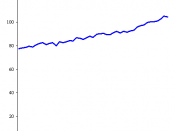As we sailed into the new millennium, humans crossed a threshold never before witnessed in our species. We flew past the 6 billion mark in number. This is an impressive figure, but not one that we can easily appreciate, unless we are Bill Gates or ExxonMobil.
Let's try to understand how incredibly large this number is. Consider that this article has ~9000 letters. Thus, it would take more than 650,000 copies of it to produce enough letters to represent all humans. Or, put in other terms, consider that if all the humans were to hold hands side by side, our species would circumscribe the equator nearly 14 times! And perhaps, most horrifying, if we all were to move to Texas (the 2nd largest state in our nation), each one of us would only have a theoretical room 35 ft by 35 ft to ourselves-assuming no room for other forms of life or human "necessities" such as airports, lawns, and shopping malls.
So now that you have an idea of how big a number 6,000,000,000 is, are you even more convinced that human population has become too large? The evidence, at first glance, appears overwhelming. The world's population has grown from 1 billion in the early 1800s to over 6 billion today. Two nations in the world (namely, China and India) themselves each have more than 1 billion people now. According to United Nations' statistics, around 2 billion people (1 in 3) suffer from malnutrition and dietary deficiencies and more than 800 million (1 in 7) are chronically malnourished. Add to this that resources are becoming depleted and ecosystems (and their animal and plant residents) are being decimated. Worse yet, if world populations continue to grow at the rates observed in 2000, the world's population will surpass 24 billion people...


